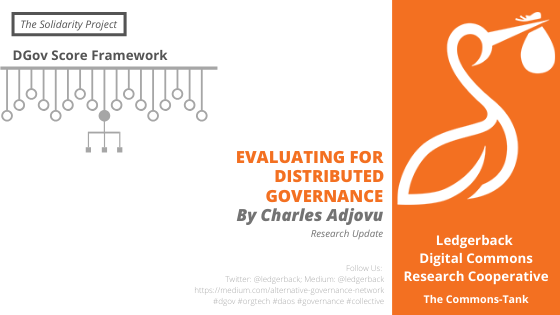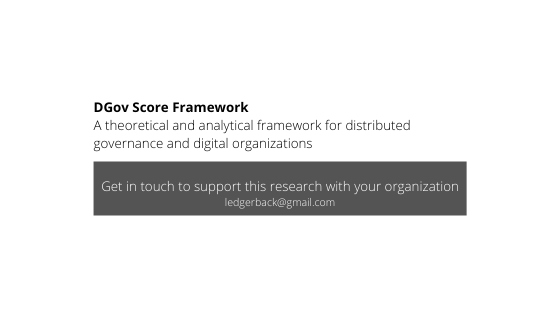Evaluating For Distributed Governance in Internet-Native/Digital Organizations: Research Update and Future Directions
Charles Adjovu, The Soldarity Project — DGov Score Framework
Introduction
The DGov Score Framework is a theoretical and analytical framework for distributed governance and digital/internet-native organizations.
The DGov Score Framework (“Framework”) is a community-driven organization science project run by the Solidarity Project, a research group within the Ledgerback Digital Commons Research Cooperative (“LDCRC”).
The Solidarity Project focuses on researching organizations (design, analysis, science), governance, and technical infrastructure for organizations that are developing in the blockchain and Web3 ecosystem. The Solidarity Project often focuses on the following, non-exclusive topics:
- Distributed Governance (DGov)
- Algorithmic Governance (AGov)
- Decentralized governance
- Governance systems
- Voting systems
- Reputation systems
- Internet-native organizations/communities
- Decentralized Autonomous Organizations (DAOs)
- Organiz[ing/ational] Technology (OrgTech)
- Collaboration software
- Collaborative organizations
- Blockchain governance
- Online communities
- Web3 ethos
- Transaction costs
- Principle-agent dilemma
- Decision-making
- DAO ethos
The Framework is being developed to theoretically and analytically organize digital organizations,with a particular emphasis on distributed governance practices and member growth within organizations.
We started working on the Framework to do some sense-making of the DGov space and organizations in the blockchain ecosystem, and to address some of the following questions:
- What is Distributed Governance?
- What makes Distributed Governance different from other governance systems?
- Is there a difference between Distributed Governance and Organizing Technology?
- Why do current DAOs often exhibit centralized governance?
- Can Organizing Technology guarantee Distributed Governance in Organizations?
- How do we distinguish one type of organization from another?
- What types of organizations are well suited for Organizing Technology?
- How do we determine if an organization’s governance system is decentralized?
- How do we make comparisons between organizations?
- How are members participating in the governance and operations of organizations?
- How do we measure voting power and parity in Organizations?
- Is there a difference in Distributed Governance between organizations with formal documentation and organizations with informal documentation?
- What makes one organization more effective than another organization?
- How to address the complexity of organizations?
- Do Distributed Governance practices require Information and Communications Technology (ICT)?
To address our concerns and questions, we are developing the Framework to be a one-stop shop for organization design and analysis (with a specific emphasis on Distributed Governance) for anyone trying to understand digital organizations, and especially those in the blockchain and Web3 ecosystem.
We are developing the Framework by:
- Having a community-driven approach
- Conducting background research in organization science, management theory, and evaluation; and
- Iteratively developing versions of the Framework to take into account the multidimensionality and complexity of organizations; and
- Designing instruments to test our models developed in versions of the Framework;
- Making toolkits (educational guides, instruments, etc.) for anyone to use to understand, analyze, and improve organizations regarding Distributed Governance and Algorithmic Governance.
In this research update, we will go over the upgrade to Version 0.6, our work on our instruments, collaboration opportunities, documentation and future directions.
Framework Foundations
Upgrading to Version 0.6
We are moving on to the next version of the Framework, Version 0.6.
In Version 0.6, we are now including evaluation research in the Framework. Specifically, we are looking into evaluation research for developing our Organization Effectiveness instrument and model.
The main questions we want to address with our evaluation research is how to create an instrument and model for Organization Effectiveness that can compare organizations based on their generalities, and/or contextualize to a Distributed Governance context.
Additionally, we will also look into distinguishing Algorithmic Governance from Distributed Governance and how that relates to our earlier thoughts on the difference between Distributed Governance and Organizing Technology.
Other than that, the Framework remain the same as in Version 0.5, though with some changes in terminology.
Instruments
We are currently working on two instruments:
- Assessment Instrument, and
- Questionnaire.
The Assessment Instrument is a handy tool for assessing and improving Distributed Governance within organizations, ultimately culminating in a DGov score (and scores for each Distributed Governance area of the instrument). The Questionnaire is for a deeper dive into organizations so that we can ask more subjective questions, and for sensitive and possibly non-public information to aid in fully analyzing the Distributed Governance practices of organizations and aid in further developing our models.
The work on the Assessment Instrument is coming along well, with only the scoring guide for the instrument remaining before we will have a working draft of the instrument. Additionally, we are considering separating the Assessment Instrument into two separate instruments, one for Distributed Governance, and the other for Algorithmic Governance (with a specific focus on the use of tokenization, blockchain, Web3, Organizing Technology, and other algorithmic means of governing) (Alternatively, we may call this Protocol Governance).
We have a working version of the Questionnaire for Framework Version 0.5 completed (*Note: the Questionnaire applies more for Distributed Governance than Algorithmic Governance*). If you want to fill out the Questionnaire, please send a message to [email protected] or hit us up on the dgov.network forums.
Lastly, and as mentioned earlier, we will be working on an evaluation tool and model for Organization Effectiveness.
Collaboration Opportunities
The Framework is an experiment in designing, analyzing and sense-making of organizations and determining the kinds of organizations we want for the future.
Most of the current work on the Framework is going on over on the dgov.network forums so head on over there if you want to discuss the Framework, organization science (design and analysis), Distributed Governance, or anything else you think would be interesting!
Other than chatting with us on the dgov.network forums, you can also reach us via email at [email protected], on Twitter at @ledgerback, and if you get the chance, attend our community call when we host one.
We hope you share our goals and desire for learning more about organization design and analysis! Most importantly, we want to hear your thoughts, opinions and analyses on organizations and the future of organizations.
For our future work on the Framework, we are looking for people who would like to collaborate with us on the following matters:
- Developing a User Guide for the Framework
- Writing documentation for the Framework
- Developing an analytics dashboard for organizations under the Framework
- Gathering data and testing our instruments on organizations
- Taking our surveys on Distributed Governance and Algorithmic Governance topics
- Distinguishing Algorithmic Governance from Distributed Governance
- Giving us general feedback on the Framework
- Topics and papers we should review and explore for the Framework
And specifically for the Distributed Governance Assessment Instrument, you can also contribute by:
- Adding model questions (including answers) to any area in the instrument, and
- Adding model answers to existing questions in any area.
Interested in joining the Solidarity Project research group at the LDCRC? Then send an email to [email protected] and we will be in contact shortly.
Collaboration Benefits
- A personal mention in the authorship statement
- A license to adapt the Framework
- Aid in assessing Distributed Governance and Algorithmic Governance practices
- Early access to the release of instruments, documentation, toolkits, and updates
- Access to data, methods, and research for the Framework that is not publicly released
- Access to research and commentaries on Distributed Governance and Algorithmic Governance
- Early access and discounts to the certification program and mark¹
Community-driven Approach
Our ambition with the Framework is to keep the knowledge and tools open in the Commons. We hope that by doing so, we will contribute to a larger conversation around organizing (especially how to bring online collectives together) internet-native organizations for long-term sustainability and the empowerment of the members and associated communities of these organizations.
It is our strong belief — now more than ever — that research should be done in the open and that community members should be able to participate in the research process.
Documentation
You can find the majority of our documentation on the Framework on the LDCRC’s Github repository for the DGov Score Framework or the dgov.network forums.
Future Directions
In the future, we plan to work on a couple of things for the Framework.
First, we plan on creating better documentation for the Framework , especially on the background research and terminology to make it easier for anyone to understand why we developed the Framework and how to apply it (*Note: Sorry if any of the terminology or background research is confusing T_T*).
Second, we want to see if it is viable to develop either an API or analytics dashboard for analyzing organizations under the Framework.
Third, we want to investigate if we should offer a certification program and mark for organizations to certify as compliant with the Framework (i.e., Certified-DGov).
Fourth, we plan to work on a new instrument and model for Organization Effectiveness for Version 0.6.
Lastly, after developing the Intra-firm module of the Framework and a toolkit thereto, we plan to move onto the Inter-firm module.
Sponsorship
If you enjoy our research and believe that the work we are doing will add value to understanding and analyzing organizations in the blockchain and Web3 ecosystem, designing organizations that match Web3 ethos with good Distributed or Algorithmic Governance practices even at scale, educating other on methods for organizing, determining decision-making methods for empowering individuals at scale, and enabling the growth of sustainable internet-native organizations, please consider supporting us by sponsoring our research.
Reach out to us if you are interested in sponsoring our research!
Donation
You can also support our research by giving us a donation on our Gitcoin Grant for the Framework or a donation (or sponsorship) on our Open Collective page!
Gitcoin Grant
💰DGov Score Framework | Grants
OpenCollective
Contribute to Ledgerback Digital Commons Research Cooperative — Open Collective
These are all the ways you can help make our community sustainable.opencollective.com
Contact
Twitter: twitter.com/@ledgerback
Github: github.com/Ledgerback/SolidarityProject
Medium: Ledgerback Digital Commons Research Cooperative
Notes
¹If we decide to make a certification program and mark.

